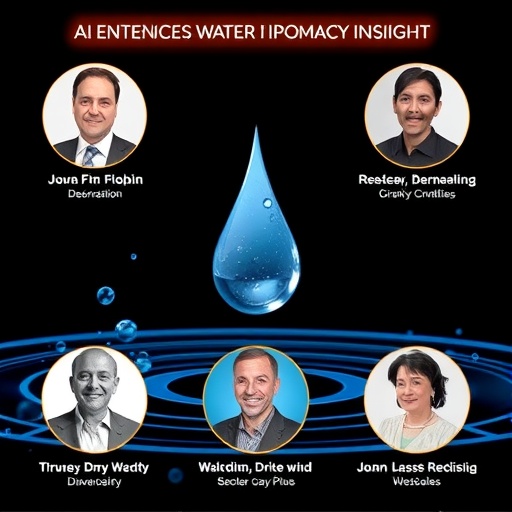Water diplomacy, the intricate balance of sharing and managing water resources across borders, has become an increasingly critical topic as global challenges such as climate change and water scarcity intensify. In a pioneering study led by researchers Kim and Ahmad, the role of Artificial Intelligence (AI) in enhancing water knowledge was scrutinized through expert interviews. Their qualitative analysis sheds light on how AI technologies can facilitate more effective dialogues among stakeholders, thereby contributing to conflict resolution and sustainable water management practices.
As the world’s population continues to grow and urban areas expand, the strains on freshwater resources become more pronounced. Traditional methods of managing water resources often fall short in addressing the complex dynamics between competing needs. This is where Artificial Intelligence steps in, offering innovative tools to analyze and interpret vast amounts of data. The study emphasizes the need for adaptive management strategies that incorporate AI to provide real-time insights into water systems. By leveraging machine learning algorithms, stakeholders can pinpoint potential conflict zones, forecast demand, and optimize resource allocation, making water management more proactive rather than reactive.
Moreover, the research highlights the critical importance of interdisciplinary collaboration among experts from various fields, including hydrology, computer science, and social sciences. Each discipline brings unique perspectives and methodologies that are essential for developing comprehensive AI tools tailored to the nuances of water diplomacy. The researchers’ interview subjects—experts deeply rooted in these intersecting fields—stress the necessity for robust frameworks that not only harness technological capabilities but also ensure these systems are equitably and ethically deployed.
A core finding of the study is that while AI has significant potential, there are numerous barriers to its implementation in water diplomacy. Concerns about data privacy, algorithmic bias, and the digital divide can hinder the adoption of AI solutions. Stakeholders are wary of how data is collected, who benefits from it, and the repercussions of incorrect AI-driven decisions. The researchers advocate for the establishment of transparency standards and ethical guidelines to assuage these concerns, ensuring that AI applications are used responsibly in sensitive areas like water management.
Additionally, the paper discusses how international organizations and governments are beginning to embrace these technologies. Initiatives that encourage knowledge-sharing between countries that share waterways can lead to more collaborative approaches. These diplomatic efforts, facilitated by AI, not only enhance communication but also align priorities and facilitate joint decision-making processes. The experts interviewed expressed optimism that, with committed effort, AI can indeed serve as a bridge rather than a barrier in international water diplomacy.
The study also delves into the public perception of AI in water management. Many communities remain skeptical about the reliance on technology for critical resources like water. The researchers found that successful implementation of AI requires public awareness initiatives to educate citizens about the benefits and risks of using AI in water systems. Engaging communities in the dialogue can help demystify the technology and promote a sense of shared ownership over local water resources.
Another significant takeaway from Kim and Ahmad’s research is the developing role of predictive analytics in water diplomacy. By harnessing AI to analyze historical data, stakeholders can identify trends that inform future action. Through predictive modeling, potential water shortages can be addressed before they escalate into crises, allowing for preemptive measures that ensure a more stable water supply. This forward-looking approach is critical in a world where climate-induced variabilities are the new norm.
Furthermore, the research presents case studies where AI has already been successfully integrated into water management systems. For instance, AI-driven platforms have been implemented in several regions to monitor water quality and levels, providing invaluable real-time data for decision-makers. Such case studies serve as a blueprint for others looking to innovate in this space, highlighting best practices and lessons learned from previous implementations.
The qualitative nature of this study allows for nuanced insights into the complex interactions among technology, diplomacy, and human behavior. The interviews reveal a tapestry of opinions on how AI could transform the future of water diplomacy. While optimism abounds regarding its capacity to foster cooperation, cautionary tales regarding misapplications serve as reminders that the success of these technologies heavily depends on human oversight and ethical considerations.
As this research suggests, addressing the challenges of water diplomacy through AI is not merely a technical endeavor but a multifaceted initiative that requires collective will, intersectoral partnerships, and a commitment to equitable access. The findings underscore the notion that while technology can enhance resource management, it should not replace essential human relationships and the rich, contextual knowledge inherent within local communities.
In closing, Kim and Ahmad’s work punctuates a crucial moment for water management as it intersects with cutting-edge technology. Their insights contribute significantly to the discourse surrounding AI and its potential to revolutionize not just water management but also the essence of collaborative governance. This research lays a foundation for future studies that will explore how AI can be effectively integrated into broader frameworks aimed at achieving sustainable water diplomacy worldwide.
Subject of Research: The role of Artificial Intelligence in enhancing water diplomacy through expert interviews.
Article Title: Making water knowledge with Artificial Intelligence: A qualitative study of expert interviews on water diplomacy.
Article References:
Kim, K., Ahmad, A.S. Making water knowledge with Artificial Intelligence: A qualitative study of expert interviews on water diplomacy.
Ambio (2025). https://doi.org/10.1007/s13280-025-02272-z
Image Credits: AI Generated
DOI: 14 November 2025
Keywords: Water diplomacy, Artificial Intelligence, Water management, Interdisciplinary collaboration, Predictive analytics, Ethical considerations, Community engagement, Sustainable practices.




